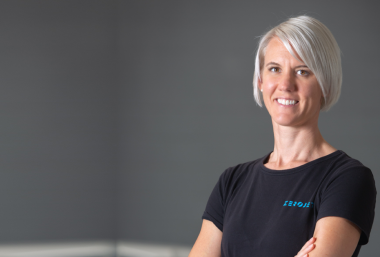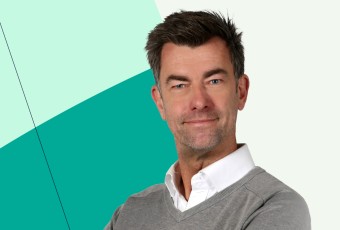As CEO of ZeroJet, Bex Rempel has been instrumental in building the world’s best-performing electric powertrain for small boats.
Along with her founding partner, Neil Mans, and a talented team of engineers, Bex’s ambitious goal is to eliminate the need for combustion engines on water.
The theme of the 2023 World Intellectual Property Day – which is all about celebrating women inventors, creators and entrepreneurs around the world – is the perfect introduction for New Zealand-based Bex Rempel.
Originally from Canada, Bex is a corporate accountant turned inventor-and-entrepreneur – who, along with her business and life partner, Neil Mans, heads up the groundbreaking marine company, ZeroJet.
The story began in 2014, when the outdoorsy couple turned their love of jet-surfing into a business idea. From running their jet-surfing business in Perth using petrol-powered boards, they started looking for a greener alternative – and produced their own electric jet-board that could hit speeds of 70km/hr.
While that was already a world-first achievement, the couple saw even bigger potential.
In 2019, they pivoted the business to creating electric jet systems that could be used on small boats.
Despite the disruptions from COVID, 2020 was a year of exponential growth for Bex, Neil and their team. After rebranding to ZeroJet and raising seed capital from investors, they successfully built and launched the world’s lightest electric jet tender, in partnership with Offshore Cruising Tenders.
Says Bex: “It was not only a bigger commercial opportunity, but a chance to have a bigger impact on the world as well. And we could see the timing was right – with the huge growth in electric cars, scooters and other vehicles.
“Our ultimate aim is to eliminate the need for combustion engines on boats…whether that’s through us, or by others. But from ZeroJet’s perspective, I feel we’re changing the perceptions of what electric boating can be.”
And while the environmental aspect is huge (taking one 20hp four-stroke outboard off the water is equivalent to taking 150 cars off the road), it’s also the high-performance aspect that excites the adrenaline junkie within Bex.
“Our technology is showing people that electric boating is also really powerful, and really fun. So as well as saving the planet, we’ve built a 48-volt system that’s outperforming anything equivalent in the market.”
Of course, building an EV that operates on water is far more technically difficult – which is why the marine industry’s evolution is about a decade behind land-based vehicles. It also requires a team of uber-talented engineers.
“That was a big question for us in the early days – how do we put together a team and get the right people on board. But it really comes down to being able to clearly outline your vision and your dream, and inspire other people along for the ride.”
ZeroJet has been able to attract some top engineering talent from the likes of Apple, Rocket Lab and Bosch Motors.
Since the early days, ZeroJet has partnered with AJ Park to protect its intellectual property. While Bex says it’s been a ‘huge learning curve’ as her personal knowledge of IP has grown, so has her appreciation of its value.
“It’s daunting at first when you don’t fully understand the process or the rationale behind protection. I used to think if somebody else can change one thing about your design and get around your patent, what’s the point? Aren’t you better off spending all that money in innovation and being market leader…”
“But over time, we’ve learned that there’s huge value in building a defensible moat around your company. It’s about continually protecting and building your company’s value, and making yourself acquirable.”
Educating the whole team about the importance of IP is also key to ZeroJet’s success. They asked AJ Park to present an educational seminar to the team, so everyone could start thinking more deeply about the potential value of their daily work.
“We don’t want IP to be seen as something that’s only discussed between the lawyers and the CEO and founders,” says Bex.
“Our engineers are the ones that are inventing and designing things. We want them to be thinking about it constantly and to be asking that question of themselves, ‘is what I’m doing just general engineering, or have I done something here that’s actually quite novel?’
When it comes to working with AJ Park, Bex says she appreciates the reassuring level of communication and advice from the firm. They primarily work with Anton Blijlevens, a principal in AJ Park’s mechanical engineering patents team, and Margot Smith and Matt Currie, who handle trade marks.
“They really clearly outline the next steps of what we do need to do to keep moving things forward, and to make sure we’re hitting our deadlines, and filing in the right countries. Anton is also very pragmatic in his advice – he doesn’t tell us to patent everything just for the sake of having a patent. We focus on what’s actually of value in building our defensible moat.
“It’s actually the little things that make something more manufacturable, or easier to assemble, or makes something easier for the customer. Those are the things you really want to protect. Or as Anton has put it to us, ‘what would you be upset about if you saw your competitor copying it’?
Written by Libby Schultz



